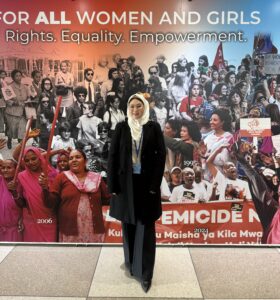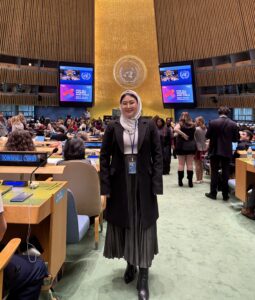Report by Helena Hassani, Modern Slavery Lead for the Mercy Foundation
The 69th Consultation on the Status of Women was held from 10 to 21 March 2025 at the United Nations Headquarters in New York. The event aimed to review and appraise the implementation of the Beijing Platform for Action, a landmark framework for advancing women’s rights and gender equality worldwide.
CSW 69 provided a vital platform for governments, civil society organisations, and activists to discuss the progress, opportunities and challenges in achieving gender equality. Participants from the around the world had the opportunity to engage in dialogues, share best practices and forge partnerships to accelerate the realisation of women’s rights globally.
During the CSW, various events and sessions were organised to facilitate dialogue amongst various government delegates and Non-Government Organisations (NGOs) to share knowledge, strengthen partnerships to advance gender equality.
- Opening ceremony: the event commenced with an opening ceremony which included statements from high-level speakers like the UN Secretary-General, the CSW Chair, and representatives of Member States.
- High-level Ministerial Roundtables: These sessions provided an opportunity for Ministers and other high-level representatives to discuss priorities and issues for their countries and share national experiences and their commitment for actions to accelerate the implementation of the Beijing Platform for Action.
- Side Events: CSW 69 featured numerous side events organised by Member States, civil society organisations and UN entities. They covered a wide range of topics concerning gender equality and women’s empowerment. These events also offered a platform for sharing experiences, showcasing successful initiatives globally while fostering collaboration amongst stakeholders.
- NGO Consultation Day: A dedicated day was allocated to civil society organisations and NGOs by providing a space to engage with government delegates. This was mainly to contribute to their perspectives on key issues with their recommendations.
Helena’s Report:
I attended various sessions however the highlight of my experience was attending the session on forced marriage. It was one of the most interesting sessions on forced marriage around the globe. Chelsea Clinton was on the panel, and she talked about child and forced marriage in the United States, and she mentioned that “We now have data showing that between 2000 and 2021, an estimated 307,365 minors were entered into marriage legally in the United States. And almost all of them, 79%, were girls married to adult men with an average spouse age difference of about four years. Some of the minors were as young as 10 years old. And that is still legal in some states, believe it or not. But most of the minors who wed were girls aged 16 or 17, and in California the marriage age is zero”.
I attended a side event called “End Forced Marriage Task Force” and was invited to join the panel where I spoke about child and forced marriage in Australia and represented Mercy Foundation. This was a small side event which was held at the United Nations Church Centre. This was an opportunity for me to talk about Australian legislations on this issue and the programs that we deliver to support the victim survivors, while highlighting my work with the Mercy Foundation in providing the in-language and in-culture workshops to address the root causes of the issue. This was perceived as one of the critical approaches to end child and forced marriage.



